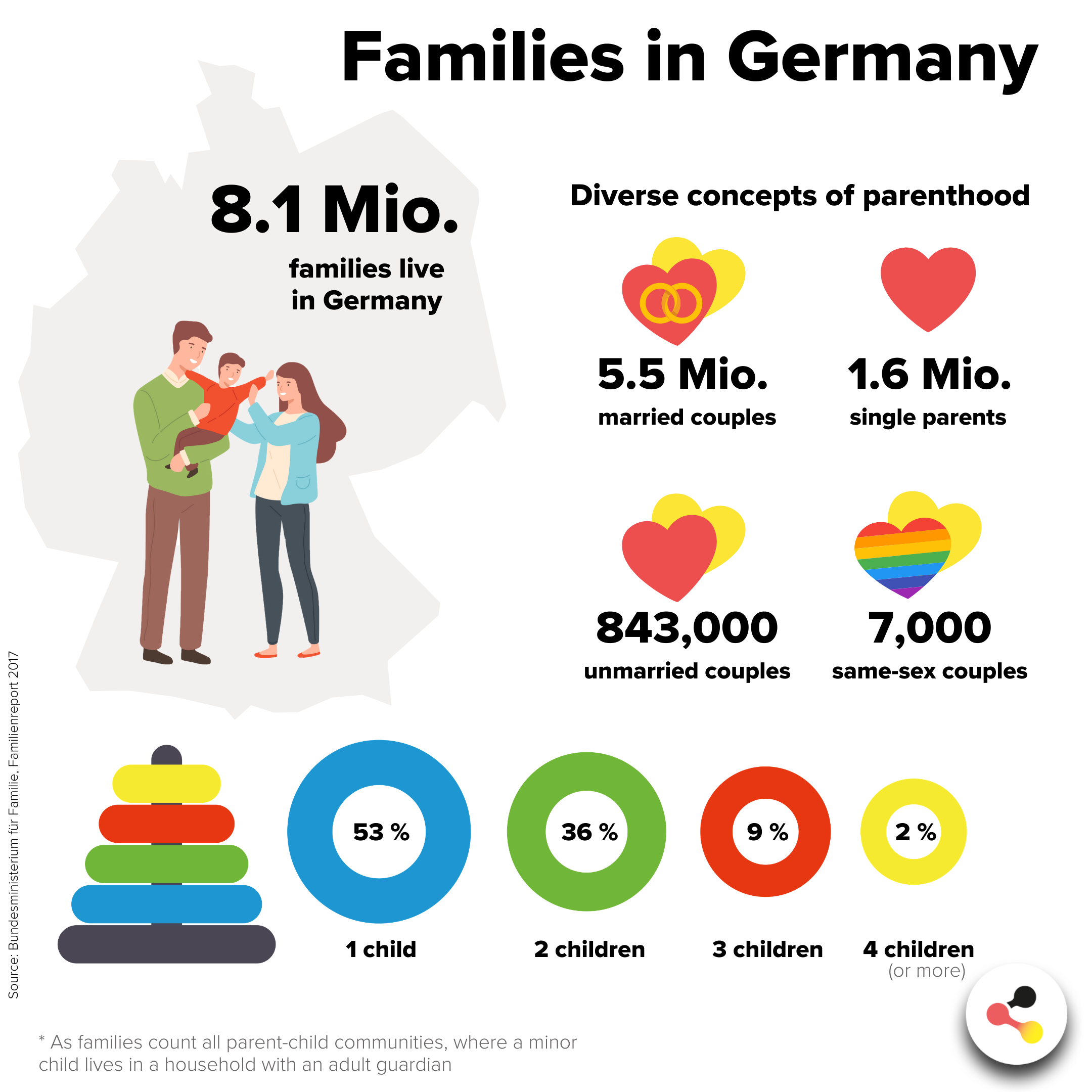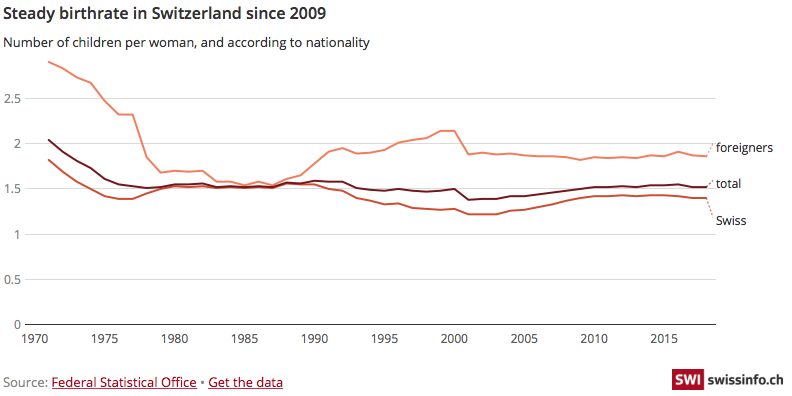1.1 Familien in verschiedenen Gesellschaften
5 min read•june 18, 2024
AP German 🇩🇪
29 resourcesSee Units
Familien in verschiedenen Gesellschaften
This unit is all about themes that relate to families in German-speaking communities. The big picture here is obviously family, but this includes lots of other ideas as well.
Family is really important to most Germans and a family home is a place where people can really be themselves. In Germany, parents and other relatives help children reach their goals and their full potential. With this in mind, it is important to note that Germans also encourage their children to be self-reliant. Being self-reliant means that people can fend for themselves and are responsible for the decisions they make. German parents believe this will make sure their kids are prepared when they move out, which is usually right after high school.
Wesentliche Fragen für Familien in Verschiedenen Gesellschaften
- Wie versteht man den Begriff “Familie” in deutschsprachigen Regionen? (What constitutes a family in German-speaking societies?)
- Was sind einige wichtige Aspekte und Werte des Familienlebens in deutschsprachigen Regionen? (What are some important aspects of family values and family life in German-speaking societies?)
- Welchen Herausforderungen müssen sich Familien heutzutage stellen? (What challenges do families face in today’s world?)
Was ist eigentlich eine Familie in deutschsprachigen Regionen?
A typical German family is made up of a mom, a dad, and anywhere between 1 and 3 kids
Eine typisch deutsche Familie besteht aus einer Mutter, einem Vater und zwischen 1 und 3 Kindern.
Both parents work: mom usually works part-time to help the kids.
Beide Eltern arbeiten: Mutter arbeitet normalerweise in Teilzeit, um den Kindern zu erziehen.
Grandparents and other family members are important and play a large role, but a lot of times they don’t live in the same neighborhood, city, or even Bundesland.
Großeltern und andere Familienmitglieder sind wichtig und spielen eine große Rolle, aber oft leben sie nicht in derselben Nachbarschaft, Stadt oder sogar Bundesland.
In most cases, the parents are married but there are also a lot of single parents, a parent living with their partner(s), or patchwork families.
In den meisten Fällen sind die Eltern verheiratet, aber es gibt auch viele Alleinerziehende, Eltern, die mit ihrem Partner zusammenleben, oder Patchwork-Familien.
Mehr als eine Art von Familie in der heutigen Gesellschaft
Kernfamilie
Die Kernfamilie ist die traditionelle ™️ Art der Familienstruktur. Dieser Familientyp besteht aus zwei Eltern und Kindern.
Alleinerziehende Familie
Die Alleinerziehende besteht aus einem Elternteil, der/die ein oder mehrere Kinder alleine großzieht. Diese Familie kann eine alleinerziehende Mutter mit ihren Kindern, einen alleinerziehenden Vater mit seinen Kindern oder eine einzelne Person mit ihren Kindern umfassen. Die Familie der Alleinerziehenden ist die größte Veränderung, die die Gesellschaft in Bezug auf die Veränderungen in den Familienstrukturen gesehen hat.
Erweiterter Familienkreis
Die erweiterte Familienstruktur besteht aus zwei oder mehr Erwachsenen, die entweder durch Blut oder durch Ehe verwandt sind und im selben Haus leben Zu dieser Familie gehören viele Verwandte, die zusammenleben und auf gemeinsame Ziele hinarbeiten, wie die Erziehung der Kinder und die Einhaltung der Haushaltspflichten.
Kinderlose Familie
Die meisten Menschen finden eine Familie muss Kinder haben, aber es gibt auch Paare die entweder keine Kinder haben können, oder wollen.
Die Stieffamilie
Über die Hälfte aller Ehen endet mit einer Scheidung, und viele dieser Personen entscheiden sich für eine Wiederverheiratung. Dadurch wird die Stufen- oder Mischfamilie erstellt, bei der zwei separate Familien zu einer neuen Einheit zusammengeführt werden.
Großelternfamilie
Die Großeltern spielen oft eine große Rolle in das Aufziehen ihrer Enkelkinder. Sie passen auf die Kinder auf und helfen den Eltern mit dem Einhaltung der Haushaltspflichten.
New living arrangements are shaping German society
Ideas of what a family is are constantly changing and evolving in Germany. The number of unmarried couples with children living together is going way up. Between 1996 and 2013 the figure doubled to 11.6 million families. Families with just one parent are also growing. Single parents make up a fifth of all parent-child dynamics and almost all of them are women.
In 2017, the Bundestag came out with the “Marriage for All” act which means all couples have access to a full marriage and can also adopt children.

Image from Deutschland.de.
High cost of childcare in Switzerland
Childcare costs in Switzerland are extremely high compared to other countries. So high, in fact, that a lot of people simply can't afford it even with government help.
According to the head of the Swiss Daycare Association (*KiTaS),*Talin Stoffel, financing daycare for one child is manageable, but more than that is simply out of the question for a lot of people in Switzerland. One full-time spot at a daycare in Switzerland costs parents about 2,500 Swiss francs a month or close to CHF 40,000 a year (that's over $42,000 a year).
Switzerland views childcare differently than a lot of other countries in Europe. In fact, Swiss voters have consistently rejected offers for government support of childcare facilities because it is seen as an additional financial burden for taxpayers and considered interference by the state.
According to the 2011 OECD (The Organisation for Economic Co-operation and Development) report Doing Better for Families, families in Switzerland spend half of their income on childcare!
Having children is becoming a luxury in Switzerland
Women are having children later and later in Switzerland. Much like in Germany, Swiss mothers are waiting to have children until they are financially, and professionally secure. The average age of mothers in Switzerland is 30.9 years old.
Swiss couples are not just having children later in life, they're also not having that many. Women have, on average, 1.52 kids. Interestingly enough, women born outside of Switzerland but living in the country have on average, more children than Swiss women.

Image from Swissinfo.ch.
Another reason women aren't having that many children today is because of childcare. Women in Switzerland have a relatively short maternity leave (14 weeks compared to two years in Germany). Having a child is now a tough choice that women are carefully considering: baby or career?
Browse Study Guides By Unit
👨👩👧Unit 1 – Families in Germany
1.1Familien in verschiedenen Gesellschaften
- Familien in verschiedenen Gesellschaften
- Wesentliche Fragen für Familien in Verschiedenen Gesellschaften
- Was ist eigentlich eine Familie in deutschsprachigen Regionen?
- Mehr als eine Art von Familie in der heutigen Gesellschaft
- New living arrangements are shaping German society
- High cost of childcare in Switzerland
- Having children is becoming a luxury in Switzerland
🗣Unit 2 – Language & Culture in Germany
🎨Unit 3 – Beauty & Art in Germany
🔬Unit 4 – Science & Technology in Germany
🏠Unit 5 – Quality of Life in Germany
🌪Unit 6 – Challenges in Germany
📚Study Tools
🧐Exam Skills

Fiveable
Resources
© 2025 Fiveable Inc. All rights reserved.